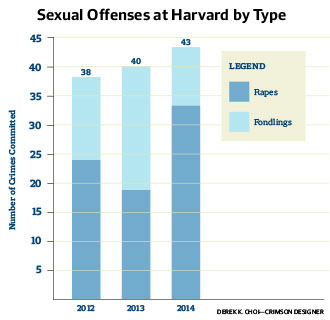
News
Summers Will Not Finish Semester of Teaching as Harvard Investigates Epstein Ties

News
Harvard College Students Report Favoring Divestment from Israel in HUA Survey

News
‘He Should Resign’: Harvard Undergrads Take Hard Line Against Summers Over Epstein Scandal

News
Harvard To Launch New Investigation Into Epstein’s Ties to Summers, Other University Affiliates

News
Harvard Students To Vote on Divestment From Israel in Inaugural HUA Election Survey
Reported Campus Rapes Nearly Double from 2013 to 2014

The number of reported rapes on Harvard’s Cambridge campus nearly doubled from 2013 to 2014, according to the Harvard University Police Department's annual security report released Thursday.
The increase in the number of reported campus rapes, from 17 in 2013 to 33 in 2014, comes with a smaller increase in the total number of reported sexual offenses. In 2014, there were 43 sexual offenses reported on campus, compared to 40 sexual offenses the year before. In the Harvard Police report, the term “sexual offense” refers to fondling, rape, incest, and statutory rape.
Of the 33 reported rapes in 2014, six were classified as “unfounded,” which the report defines as “any report of a crime that is found to be false or baseless” after an investigation by law enforcement. There was one reported rape reported on the Longwood campus.
While Harvard led the Ivy League last year in the number of reported sex offenses, Dartmouth in 2014 had 55 instances of reported sex offenses, a term which includes “rape” and “fondling.”
The report, released in compliance with the federal Clery Act, includes statistics on crimes reported to Harvard Police, local law enforcement, and “campus security authorities,” who are University officials involved in student administration. In addition to crime statistics, the report included information on HUPD crime prevention efforts, crime reporting, and emergency notifications. Steven G. Catalano, a HUPD spokesperson, emailed the report to students on Thursday.
HUPD Chief Francis D. “Bud” Riley wrote in the report that while crime may be low, Harvard students, faculty, and staff should remain vigilant.
“It is important for students, faculty, staff, and visitors to remember that we are located in an urban setting and must contend with many of the crime and safety issues that exist in any city,” Riley wrote.
The report noted that reported robberies reached a three-year low of 10, and the number of reported aggravated assaults reached a three-year low of seven. The number of burglaries, meanwhile, increased from 31 reported cases in 2013 to 40 reported instances in 2014.
The report indicated that the number of disciplinary actions taken for drug infractions in 2014 more than tripled since 2013; the number increased from seven to 22. There were 48 campus liquor law violations in 2014, down from 52 in 2013.
The sexual offense figures are released as the topic of sexual assault and harassment comes to the forefront of campus dialogue. Late last month, Harvard released what University President Drew G. Faust said were “deeply troubling” results of a campus-wide sexual assault climate survey. In particular, the survey found that 31 percent of surveyed senior women at Harvard College reported being victims of some kind of sexual misconduct—what the survey termed “non-consensual sexual contact.”
That survey also revealed students’ lack of confidence in and knowledge of Harvard’s reporting system for cases of sexual harassment and assault. Eighty percent of female College students who reported having experienced nonconsensual penetration by incapacitation, and 69 percent of those who experienced penetration by force, did not file a formal report, according to a report on the survey by former provost Steven E. Hyman.
Want to keep up with breaking news? Subscribe to our email newsletter.
